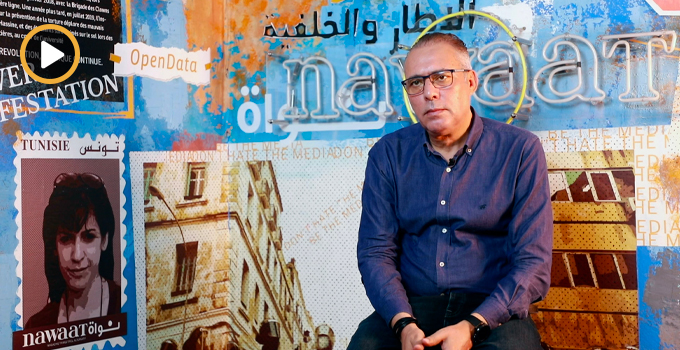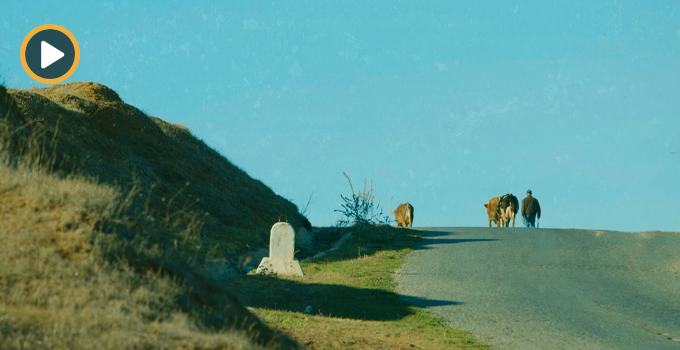
Built in 2012, the Meknassi waste water treatment plant in Sidi Bouzid has yet to commence operations, stalled by a disagreement concerning the trajectory of treated waste water. The proposal by the National Sanitation Bureau (ONAS) to transfer treated waste water into Oued Elben is contested by locals, who fear for the future of the ecosystem in a valley known for its rich biodiversity.
Oued Elben: a threatened ecosystem
Five kilometers from Meknassi, Oued Elben, –“Valley of Milk”—is a landmark of biodiversity and source of natural wealth for the surrounding region. Seven wells produce hot water and sustain the valley’s vast flora and fauna. The variety of plant life constitutes fertile pasture lands, providing for prosperous animal husbandry and other activities. Smara and halfa—plants used like straw to make hand-woven market totes—represent an important source of income for many families, and the area’s natural clay serves as a first-source material for pottery and natural remedy for a number of illnesses.
Seventy-five year old Gizela Bergueman, a German citizen, has lived in Tunisia since 1965. She visited Oued Elben for the first time in 1972 to treat acute arthritis:
The different varieties of clay can be used to treat different afflictions, not only skin conditions but also rheumatism. On summer evenings, we used to bathe close to the wells where I discovered the exceptional therapeutic qualities of Oued Elben. It should be an international destination for natural medicine and ecological tourism given its unique natural landscapes.
According to Ridha El Ghabri, the valley is the engine of economic activity in Meknassi. In addition to animal production, handicrafts, and the treatments it provides, Oued Elben is a source of potable and irrigation water for those who do not have access to the National Water Distribution Utility (SONEDE) grid. El Ghabri, a horse breeder, is a strong opponent of the ONAS project. The valley’s ecosystem is a natural environment suited to the needs of his pure blood Arabs.
Back-and-forth with ONAS
In 2012, ONAS installed the new waste water treatment plant in Meknassi; three years later, it has still not been connected to households in the region. According to ONAS regional director Ahmed Ben Rehouma, the delay is a consequence of residents’ continued resistance to proposals for the trajectory and discharge of treated waste water from the plant. Three propositions have been blocked by landowners who would be impacted by the expropriation measures.
After several months of negotiations, we have opted for a fourth solution which will cost us more, but which has provoked less opposition.
The chosen pathway crosses the property of one farmer who accepted partial expropriation and, according to ONAS, hopes to use the waste water for the irrigation of his crops. However, the risk of pollution is great since the ONAS project would include a pipeline that runs along the road towards Rgueb as well as a spillway in the valley, several hundred meters to the east.
El Ghabri told Nawaat that “ONAS insists on polluting Oued Elben and is not even trying to avoid this natural catastrophe. If treated waste water is dumped into the valley, the entire population will be forced to leave Meknassi. What is worse, Tunisia will lose a natural reserve that nourishes and sustains hundreds of people.”
Karim Chaouech is an environmental expert who has supported civil society’s demands to the Ministry of the Environment regarding the ONAS project. Chaouech affirms that
Meknassi does not need a water treatment plant. Moreover, there is no visibility around the feasibility studies and risks associated with this project. Before building a waste water treatment plant, ONAS should have determined the trajectory of treated waste water. It goes without saying that ONAS’ general policy—dumping treated waste in the sea or valleys—is truly absurd. We can use other treatment methods with less damage and pollution, such as the installation of septic tanks, only these solutions do not please everyone, especially those who profit from ONAS tenders processes.
On 24 April 2015, the Minister of the Environment and Sustainable Development, Najib Darwich (a member of the political party UPL, headed by Slim Riahi, the presidential candidate notorious for his extravagant electoral campaign in 2014), visited Meknassi to launch the ONAS project. Residents voiced their concerns and demanded that treated water not be discharged into the valley. “The minister seemed understanding and promised to preserve the valley and to find a reasonable compromise. Several weeks later, ONAS maintains its position and has informed us that the Ministry did not intervene to clear up the situation,” El Ghabri told Nawaat.
Rehouma explained that once the treatment plan had been made and the feasibility studies validated, ONAS proceeded with construction of the treatment station and work on the trajectory (the trajectory generally takes less time to complete than the treatment plant). “Concerning treatment methods, for the moment we don’t use any alternatives. Remember that treated water has been used for centuries to irrigate citrus and vegetable crops; it does not represent any danger for the valley’s ecosystem.”
Audit report condemns ONAS
The concerns of Meknassi residents are not unfounded. ONAS’ less-than reassuring discourse does not obscure the impact of waste water on the environment. Ezdine Ferjani, professor of chemistry at the Institut supérieur des sciences et techniques de l’environnement (Borj Cedria), says that «avoiding the health and ecological risks of waste water requires two conditions. The first is adequate treatment of the water; there are three levels of treatment, only one of which—the third—guarantees the elimination of heavy metals which can affect biodiversity. The second condition is to ensure consistent chemical and bacteriological quality control on the waste water treated in these stations.”
A 2014 Court of Auditors report raises a red flag around ONAS’ waste water treatment and management practices. The report provides proof of “ecological degradation of the areas that receive treated water,” notably the gulf of Tunis and the valley of Medjerda among other regions.
According to the same study, 63% of treatment plants are not subject to any form of quality control. 61% of the volume of water treated does not conform to current regulations, and 42% of treatment plants discharge waste water that has not been treated in compliance with regulations. The report points out the sanitation hazards associated with such water used to irrigate agricultural lands. Significantly, there was no follow-up for 96% of the violations committed by ONAS between 2009 and 2012.
There is a great deal of work to be done if ONAS intends to improve its approach to waste water management. With the possibility of an ecological disaster looming ahead, Oued Elben may represent a rupture in the centralized, bureaucratic, and inefficient management of public health issues—unless the corruption network decides otherwise. Already mainstream media has begun to meddle in the affair: a TAP report on 20 September 2015, recirculated by La Presse de Tunisie, eludes the problem awaiting Meknassi with a detailed description of the region’s natural diversity and historical significance. A colorful photograph accompanies the text, a landscape of wild grass and red poppies which will never bloom in Meknassi, but in Ain Kermes—in the north-west of Algeria. One sentence alluding to the affair presumes that the reader might guess at Meknassi’s imminent ecological disaster, and, in that familiar style of propaganda which thrives under dictatorship, there is not a single reference to the ONAS, waste water treatment, or spillway projects.








iThere are no comments
Add yours